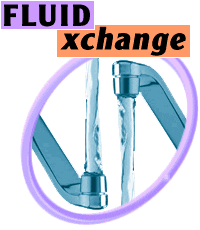A new website for people who’ve tested HIV-positive has many observers very suspicious of its true intent, and of its creator’s ties to a large pharmaceutical company.
David Doig of the AIDS Committee Of Toronto went straight to his computer when the “Are you positive?” advertisement first appeared on the back page of the March 25 issue of Xtra. (The ad also appeared in Xtra West in Vancouver, Capital Xtra in Ottawa and Fab National.)
The “site” provided no information about its own sponsorship and was aimed at people with HIV or AIDS. It consisted of a few lines describing the intent of the site, followed by a request for the names and addresses of interested parties. Doig was horrified.
Somebody was trying to collect names and address of people with HIV! Ruth Carey, a lawyer with the HIV And AIDS Legal Clinic Ontario, explains that, as a matter of policy, the clinic encourages people not to disclose their status “because the reality is so many bad things happen when they do disclose, that it’s safer not to.”
Worse, she says that in Ontario, private businesses or private individuals are not required to follow any privacy laws. That means that if you tell a company or a business person that you are positive, they have no obligation to keep quiet about it. And if they spread the news around, you have no way to stop them – there is, says Carey, no legal remedy.
Appalled by what he’d seen, Doig, who is referral services coordinator for ACT, contacted the man who had placed the advertisement, Bijan Kotabi. According to Doig, Kotabi said collecting such information “was not his intention at all” and the request for a full name and home address promptly disappeared from the website.
(At the time of writing, the site still has no content, but asks for an
e-mail address, with city and country identification being optional.)
But for someone who has told several people that he just wants to help people with HIV/AIDS, Kotabi seems, by that first blunder, to be, at best, profoundly ignorant of their concerns.
Kotabi is in the advertising business: he said in an interview that he
recently incorporated his advertising firm – Kotabi Advertising – after a couple of years in business as a sole proprietor. That firm has as a client DuPont Pharma, the Canadian subsidiary of DuPont
Pharmaceuticals, which manufactures Sustiva, a new AIDS drug. (Dupont has been attacked for pricing Sustiva fifty percent higher than comparable drugs.)
But Kotabi insists DuPont has nothing to do with the website ads, but rather that he, through his recently incorporated HIVnews Inc, has been footing all the bills.
The cost of the two full page ads already placed in the three Xtras would amount to about $15,000, based on a rate for a package of three ads. Kotabi also has a large advertisement painted on a wall at Church and Wellesley, but he declined to say how much he has spent promoting the website.
John Brennan, public affairs director for DuPont Pharma, also says DuPont has not put money towards advertising for the website. But Kotabi Advertising “has been doing some creative work for a prevention campaign we’re doing,” Brennan says.
Caroline Elie, director of business development for Xtra, says that “All I know is that I’m only working with him [Kotabi]” on the website ads. But she said he “has spoken of booking for Dupont,” and in particular placing a Dupont advertisement in the Pride Guide.
Why is Kotabi advertising a website, before it is operational, and not
providing any information about who is sponsoring the site?
Well, it appears to be a game of if you build it (or at least promote it), they will come and leave their e-mail address, and then you can show sponsors the site’s potential and get some funding.
“People will see the ad and go to the website… It’s difficult to
promote” a website to would-be sponsors or advertisers without advertising the site, Kotabi says.
But he also says that: “At the moment, we have enough funding. If I don’t get any sponsors, I can still do it. Part of the money from sponsorship will be donated to AIDS organizations.”
Meanwhile, Kotabi seems to expect that all information on the website will come from users. The site will, according to a press release dated Apr 28, post “content provided by community and professional sources. We then provide all visitors to the website an opportunity to comment on or debate the posted content….”
Kotabi compares his plans for his site to a couple of existing US sites, and says he decided to create the site because there was a gap in Canada.
Kotabi says the site “will not send any advertising” to people who have provided their e-mail address. “None of the information is going any place; we just need the e-mails.”
Doig says Kotabi reassured him that e-mail addresses are not being collected to sell to pharmaceutical companies. Similarly, Kotabi maintained he does not intend to sell companies a statistical analysis of what locations on the website are popular with which service providers, Doig says.
Kotabi has to date had meetings with several AIDS service organizations, including ACT and the Community AIDS Treatment Information Exchange (CATIE) – primarily, it seems, to explain his intentions and seek assistance.
Glen Brown, CATIE’s acting general manager, says his organization has not authorized Kotabi to link to CATIE’s website, or use CATIE material. “We’re just cautioning people about what information they give to the site, since it is not clear who has access to that information.”
Meanwhile, although Doig says he has concerns about the role sponsorship could play in the site, he has helped Kotabi with his press release for the site.
“It makes sense for a Toronto AIDS service organization to be involved, questioning his motives and proofing his work.”

 Why you can trust Xtra
Why you can trust Xtra


